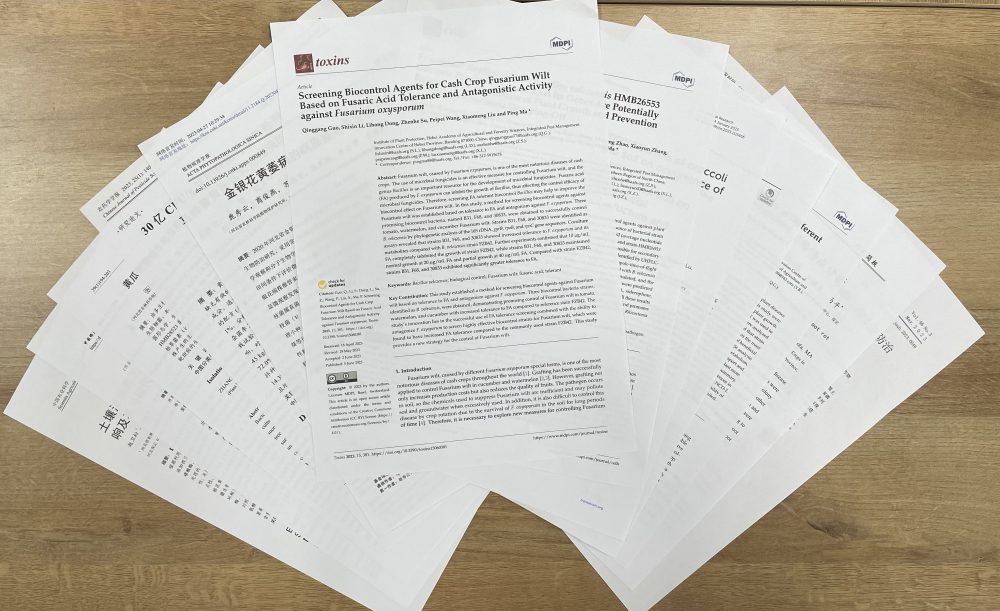biological control, as a new type of control method, is rapidly developing in the field of plant diseases. the discovery of biocontrol bacteria is an important process in biocontrol research. there are many types of biocontrol bacteria, with excellent biological characteristics, diverse antagonistic mechanisms, and a wide parasitic range. they are important biological control methods for solving plant diseases and have broad development prospects. aiming at the prominent issues of the lack of biological control products for important crop diseases(especially grain and economic crops), the plant disease biological control research department of the institute of plant protection has screened efficient strains of biocontrol microorganisms, studied the persistence and control mechanisms of biocontrol microorganisms, identified new functional genes for biocontrol strains, developed efficient green production processes, and created new formulations, products, and supporting application technologies for important diseases and planting technology systems. in the first half of this year, breakthroughs were made in scientific research work, and 12 scientific papers were published in journals such as toxins, cells, and frontiers in bioengineering and biotechnology. among them, 1 paper was published in sci chinese academy of sciences zone 1, 3 papers were published in zone 2 (1 paper in top journal), 1 paper was published in zone 3, and 5 papers were published in first-class academic journals.
in the research and development of key technologies for identifying and preventing important crop diseases: the honeysuckle verticillium wilt caused by verticillium dahliae in china was reported for the first time, and it was suggested that "1 billion spores/gram of bacillus subtilis wettable powder" can effectively prevent and control this disease; clarified and reported the types of pathogenic bacteria and infection characteristics of the root rot disease of the radix glehniae, which is caused by the mixed infection of rhizoctonia solani and fusarium solani. research has found that returning broccoli residues to the field can reduce the number of verticillium wilt bacteria in the rhizosphere and plant body, improve soil nutrients, and increase the relative abundance of beneficial bacterial communities in the soil. this also reveals the ecological mechanism that cotton-corn rotation and cotton-corn-broccoli residue rotation can significantly reduce the occurrence of verticillium wilt compared to continuous cropping.
in the development of microbiological fungicides: a method was established to screen efficient biocontrol strains of crop wilt disease using a combination of tolerance to fusarium acid and the ability to resist fusarium oxysporum, and three promising biocontrol bacteria b31, f68, and 30833 were obtained. an effective biocontrol bacterium hmb28521 for cucumber target spot disease was screened out and it was identified as bacillus velezensis, providing new resources for the biological control of this disease. the bacterium phodg36 has been identified as bacillus amyloliquefaciens, which has multiple important functions such as phosphorus solubilization, growth promotion, and disease prevention (especially significant antibacterial effects on potato black spot bacteria). it can be applied to the industrial development of multifunctional microbial products for disease prevention and yield increase. the development of the "3 billion cfu/g bacillus wettable powder" can effectively prevent and control soil borne diseases in potatoes and has a significant increase in production. it provides a new type of plant protection product and application plan for ensuring green production of potatoes.
in the research on the mechanism of biocontrol microbial action: bacillus thuringiensis hmb26553 was identified as bacillus velezensis and its disease prevention and growth promotion mechanism was analyzed. research has found that bacillus subtilis ncd-2 has potential growth promoting effects on different crops such as tomatoes and chili peppers, and it has been confirmed that the growth promoting ability of the strain is related to the amount of colonization and the types of microorganisms recruited.

(source from www.hebnky.com)